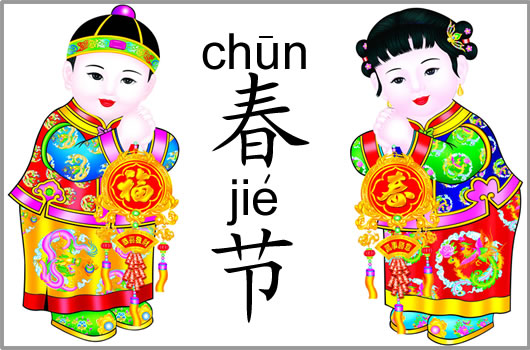A Beginner’s Guide to the Spring Festival Posted by sasha on Feb 18, 2015 in Culture
Chinese New Year is almost here, which means we’re about to say goodbye to the Year of the Horse and welcome in the Year of the Goat. This year, China will celebrate its New Year’s Eve on February 18th with the annual CCTV Gala, and plenty of fireworks will usher in the New Year that begins the next day. Over the years, we’ve had tons of posts about the Spring Festival, the most important of all Chinese holidays. One tradition of this festival is cleaning up, so I went ahead and did just that by organizing all of our Chinese New Year related posts into an easy to navigate guide. Get those train tickets, make some dumplings, hang some couplets, fill a few red envelopes, and get your fireworks ready, because it’s time for Spring Festival in China! Each heading is a link to the related post; after reading them all, you’ll be an expert on the biggest Chinese holiday of them all.
Spring Festival Vocabulary

China’s Spring Festival
Learn 20 useful Chinese words/phrases related to the holiday, and then practice talking about it with your Chinese friends/colleagues/classmates/that nice old man who’s always hanging out around your building.
History of the Spring Festival
The story of Spring Festival goes back a long time, when a savage beast called Nian would come to the villages to feast on children. How did the villagers get rid of him, and what does this have to do with the modern day celebration? Find out here!
Take a break from reading to watch this video introducing the Spring Festival.
Spring Festival Superstitions and Traditions
Why shouldn’t you get a haircut or buy new shoes in the first month of the New Year? Why do Chinese people like to eat fish and dumplings for the holiday? Why should you clean your house before the festival but not during? The answers await you.
Spring Festival Days 2-15
The actual festival lasts for 15 days, so there’s much more to Chinese New Year than just the first day. Most people will have an entire week off of work, and there are things to do for each of those days. Find out what people do on days 2-15 in this post.
A great short that gives a lot of insight into Chinese New Year.
The Chinese Zodiac Calendar
A funny video from Off the Great Wall about the zodiac.
Learn the story of the Chinese zodiac and the vocabulary for all twelve animals by reading this post. There’s a lot more to the zodiac than just the animals though. Get the yin and yang so you’re not in the dark about the significance of the New Year.
Spring Festival Rush

Photo by David Woo on www.flickr.com
Every year, the biggest mass migration of people occurs in China during the lead-up to the Spring Festival. Train stations, airports, and highways are clogged with people trying to either get home or get the hell out of dodge on a vacation. Get the details on the phenomenon known as chun yun (春运 – chūn yùn) here.
CCTV New Year’s Gala

The most watched TV show on Earth.
On New Year’s Eve in America, millions of people tune in to watch a ball drop in New York City. In China, even more flip on their tellies to catch the annual “Chun Wan” (春晚 – chūn wǎn) gala on CCTV. Find out what’s on this 4-hour broadcast and even check one out from a few years ago.
https://www.youtube.com/watch?v=obzdERlHv_I
Check out a performance from last year’s gala.
Lantern Festival History and Traditions

Photo by Ting W. Chang from www.flick.com
The Lantern Festival marks the end of the Spring Festival, and what an end it is. On the 15th and final day, the most important Chinese holiday goes out with a bang, to say the very least. There’s a bit more to the Lantern Festival than just disposing of all your fireworks, though. Read this post to get the details.
An awesome highlight reel of a lantern festival.
We’ll end this post with two common greetings heard throughout the festival:
Happy Spring Festival!
春节快乐 – chūn jié kuài lè
Wishing you a prosperous New Year!
恭喜发财 – gōng xǐ fā cái

Build vocabulary, practice pronunciation, and more with Transparent Language Online. Available anytime, anywhere, on any device.
About the Author: sasha
Sasha is an English teacher, writer, photographer, and videographer from the great state of Michigan. Upon graduating from Michigan State University, he moved to China and spent 5+ years living, working, studying, and traveling there. He also studied Indonesian Language & Culture in Bali for a year. He and his wife run the travel blog Grateful Gypsies, and they're currently trying the digital nomad lifestyle across Latin America.




Leave a comment: